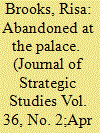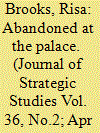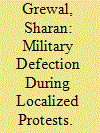| Srl | Item |
| 1 |
ID:
120283


|
|
|
| 2 |
ID:
120295


|
|
|
|
|
| Publication |
2013.
|
| Summary/Abstract |
Many analysts have focused on the Tunisian protests and the economic and political grievances that fueled them. Equally central, however, was the role played by the military leadership and the decision to forgo using force to actively suppress the protesters. Contrary to arguments that stress the reflexively apolitical or professional nature of the military, or its leaders' normative commitment to supporting the protesters, this article explains how the decisions made reflected political calculations and served the military's organizational interests. Although heralded as the savior of the revolution, the Tunisian military acted out of its own organizational self-interest in defecting from the Ben Ali regime.
|
|
|
|
|
|
|
|
|
|
|
|
|
|
|
|
| 3 |
ID:
167427


|
|
|
|
|
| Summary/Abstract |
In May 2017, the Tunisian military allowed protesters to storm and shut down an oil valve in Tataouine, in contravention of a direct order from President Essebsi to defend the production site. While scholars have recently examined military defection during mass uprisings, these protests were small and localized. Why did the military disobey President Essebsi in Tataouine? Drawing upon a survey of military officers conducted six months prior to the defection, I show that the military's composition and corporate interests, rather than its professionalism, likely prompted its defection. The majority of the military hails from impoverished regions in Tunisia's neglected interior and identifies with the demands of protesters in these regions. The military also saw the curtailment of its material and political interests in early 2017, giving it little incentive to repress protesters on the regime's behalf. Methodologically, this study provides some of the first survey data of military officers’ attitudes toward defection.
|
|
|
|
|
|
|
|
|
|
|
|
|
|
|
|
| 4 |
ID:
146620


|
|
|
|
|
| Summary/Abstract |
Why did some Arab militaries remain loyal to authoritarian rulers amid mass uprisings during the Arab Spring while others defected to the opposition? One popular explanation shows this variation with reference to the degree of military institutionalization: institutionalized militaries defected, while patrimonial militaries remained loyal. This article argues that the institutionalization hypothesis does not provide a complete account of the mechanisms through which the degree of military institutionalization leads to either defection or continued loyalty. This shortcoming stems from the fact that scholars have treated military institutionalization as a catch-all concept for three distinct variables: ethnic stacking of the military, patronage distribution, and organizational factionalization. Examining the interaction between these variables highlights the mechanisms through which military defection occurs, and therefore that disaggregating institutionalization into its component parts provides a more complete explanation of military behavior during the Arab Spring.
|
|
|
|
|
|
|
|
|
|
|
|
|
|
|
|